Employment-related tax rules usually get the dominant hype, leaving the freelancers questioning themselves how do we pay taxes? Do we even need to pay taxes? If yes, what are the rates? Where to start from? How to proceed? And so on! If you’re a freelancer in India, understand that you’re not alone who have these questions. This is more so because freelancers are left with minimal guidance on this topic, unlike the regular employees, whose employer would enlighten them about the taxes; or the employer, who would probably be hiring some accountant for the company. This guide enlists all the tax rules for freelancers in India. Feel free to leverage it, for understanding your way through the taxes and staying safe legally.
Table of Contents
The Ultimate Guide to Tax Rules for Freelancers in India
Understanding the Concept of Freelancing and Their Taxes in India
Who is a Freelancer?
A freelancer is a self-employed person, who works on a short-term contractual basis, receiving money on a per-project or per-work basis. They are hired by both individual clients and companies, but when hired by a company, they are usually not given the status of an employee. They are not legally bound to work for only one person at a time. As a result, they can invest their time in multiple projects working for multiple clients at the same time, along with enjoying flexibility.
Different Income Sources of Freelancers
The Indian freelancers earn from these following sources:
- Project-based work: An Indian freelancer mostly earns from project-based works. These works range from software development to website designing to content writing to marketing to accounting and so on.
- Skill-based work: In India, a person can easily leverage his or her natural skill sets to earn substantial cash. For example, if one is good at photography and videography, they can opt for it professionally on a freelance basis. Other such services include writing, editing, giving voice overs and so on.
Teaching & training: The expert and high-earning freelancers can further offer training and coaching sessions/ workshops online, and that can be considered a separate
- freelancing earning source. Moreover, people can teach dance, bakery, arts and crafts under this segment, based on client requirements.

- Affiliate marketing: Affiliate marketing is basically an “advertising model” wherein a company leverages a third-party affiliate to generate leads for the products and services provided by the company and subsequently make sales for them. Herein, the third-party affiliate usually acts as a freelancer and receives incentives from the company based on their sales or lead generation.
- Selling online: Digital products like e-books, online courses, templates, plugins and so on can be sold online by persons making them, and they would be treated as freelancing income sources as well.
- Others: Freelancers can rent out their unused properties online (e.g., Airbnb) and make some extra cash. Freelancers can further act as a middleman to connect other clients to fellow freelancers and take some commission for it.
Why Should Freelancers Pay Taxes?
The Income Tax Act of 1961 states that Indian freelancers, just like any other salaried person or business owner, must pay taxes if they earn. However, Indian freelancers enjoy a special tax benefit in this regard. Section 44ADA (i.e., Presumptive Taxation Scheme) of the Act allows freelancers to pay taxes for only half of their gross annual income if their total earnings remain below ₹50 lakhs. Precisely speaking, Indian freelancers need to pay taxes to oblige to the basic regulatory obligations, enjoy tax benefits, and build a good reputation and credit history, the same as any other earners. This is as per the tax rules for freelancers in India.
Tax Rules for Freelancers in India: Tax Regimes and Tax Slabs
Application of Income Tax Act for Freelancers
Indian freelancers pay income tax based on how much they earn from freelancing on an annual basis. They are eligible to choose their taxation policy based on the different tax systems. Usually, they should be selecting the tax regime that would provide them with maximum benefits and deductions. The income tax deductions/exemptions (under the Income Tax Act of 1961) for the Indian freelancers have been displayed in the section hereunder:
|
Section |
Description |
Deduction/Exemption |
|
80C |
Investment on FD, child’s education, ELSS, etc. |
₹1,50,000 (in combination with the upcoming two sections) |
|
80CCC |
Contribution towards pension plan |
₹1,50,000 (in combination with the section before and after) |
|
80CCD(1) |
Central Government Pension Schemes |
₹1,50,000 (in combination with the above-mentioned two sections) |
|
80CCF |
Long-term infrastructure bonds |
₹20,000 |
|
80CCG |
Government Equity Savings Scheme |
₹25,000 |
|
80D |
Health insurance premiums for self, spouse, children & parents |
Variable |
|
80DD |
Medical treatment for disabled dependents |
₹75,000 |
|
80G |
Charitable donations |
100% (on some cases) |
|
80E |
Interest on education loans |
Interest paid (max 8 years) |
|
80EE |
First-time home loan interest |
₹50,000 |
Note: The table has been prepared for informational purposes only. Consult a tax expert to get further clarity on this. Contact Actax India for such expert help. In India, there is a concept of an advance tax payment schedule, which the freelancers are supposed to pay every month so that they don’t have to pay it all at once at the end. These include payments made on specific dates, which are June 15th, September 15th, December 15th, and March 15th; and assist freelancers in better finance management. Section 234B and 234C of the Income Tax Act fine those who are unable to make these payments within the set time limit with penalties and interests. To avoid these penalties, freelancers should ensure that their total advance tax payments are made before March 31st of every financial year.
Selecting the Right Tax Regime (Old vs. New)
The advantages and disadvantages of the old tax regime and the new tax regime for Indian freelancers have been enlisted hereunder:
|
Tax Regime |
Pros |
Cons |
|
Old Tax Regime |
It is more suitable for freelancers with high documented business expenses. Under the regime, rent, office supplies, travel, internet, subscriptions, and equipment depreciation can be deducted, which decreases the amount of money considered as taxable income. |
It has a more complicated tax filing process. This is because the recording of all the deductions may at times be tiresome. |
|
New Tax Regime (April 1, 2020 & Onwards) |
It has a comparatively simpler tax filing process. Moreover, the rates of taxes are also low under this regime. |
It comes with limited tax benefits/deductions/exemptions for highly documented freelancers, unlike the previous regime. |
Note: To choose the right tax regime, consult a tax expert. The table above has just provided a very generalized idea. In this regard, you can also seek the help of Actax India.
Tax Slabs for the Indian Freelancers
The tax slab for Indian freelancers under 60 has been displayed in the section hereunder:
|
Income Tax Slab |
Old Tax Regime |
New Tax Regime (Until March 31, 2023) |
New Tax Regime (From April 1, 2023) |
|
Up to ₹2,50,000 |
Nil |
Nil |
Nil |
|
₹2,50,001 – ₹3,00,000 |
5% |
5% |
Nil |
|
₹3,00,001 – ₹5,00,000 |
5% |
5% |
5% |
|
₹5,00,001 – ₹6,00,000 |
20% |
10% |
5% |
|
₹6,00,001 – ₹7,50,000 |
20% |
10% |
10% |
|
₹7,50,001 – ₹9,00,000 |
20% |
15% |
10% |
|
₹9,00,001 – ₹10,00,000 |
20% |
15% |
15% |
|
₹10,00,001 – ₹12,00,000 |
30% |
20% |
15% |
|
₹12,00,001 – ₹12,50,000 |
30% |
20% |
20% |
|
₹12,50,001 – ₹15,00,000 |
30% |
25% |
20% |
|
More than ₹15,00,001 |
30% |
30% |
30% |
Note: The tax slab for Indian freelancers (as per the latest tax regime) above 60 has been displayed in the section hereunder:
|
Income Tax Slab |
Latest Tax Regime |
|
Up to ₹3,00,000 |
Nil |
|
₹3,00,001 – ₹5,00,000 |
5% |
|
₹5,00,001 – ₹10,00,000 |
20% |
|
More than ₹10,00,001 |
30% |
Note: The table has been prepared for informational purposes only. Consult a tax expert to get further clarity and precision on this. Contact Actax India for such expert help.
Tax Rules for Freelancers in India: Record Keeping and Expense Management
Importance of Record Maintenance for Freelancers
Irrespective of the fact that whether you’re a freelancer or a business owner, it is always prudent to keep tabs on your income and expenditures, as eventually these records only aid you during tax filing. To be specific, as per the tax rules for freelancers in India, record maintenance is important for freelancers to ensure tax compliance, expense management, business growth, audit readiness, and simplified tax filings. Moreover, the Income Tax Act of 1961 makes it mandatory for Indian freelancers to opt for proper record maintenance, based on their income level and profession. For example, for a specified profession, if the amount of annual earnings exceeds ₹1,50,000, the record maintenance should be facilitated based on Rule 6F of the Income Tax Rules, 1962.
Recommended Accounting Methods for Freelancers
Typically two accounting methods are recommended for freelancers in India (as per the tax rules for freelancers in India). Both these methods have been discussed hereunder:
- Accrual Accounting: It is the accounting method wherein expenses and payments are debited and credited either when earned or incurred. It gives a more accurate picture of the financial health of the freelancer. However, the process of accrual accounting can be a little complex.

- Cash Accounting: It is the accounting method that records all the financial transactions, but exclusively on the disbursement or receipt of physical currency. It monitors the real-time movement of the flows of cash. It is a simpler process to manage. However, it might not provide a complete picture of the outstanding expenses or incomes.
To put it simply, if you have a low to moderate freelancing income, go for cash accounting. But, if your income source has a wide magnitude, and you earn handsomely through freelancing, go for accrual accounting. It is best to consult a tax expert in this regard. Actax India can help you to go through it.
Trackable Expenses Checklist
As a freelancer in India, you can use the following checklist to assist yourself in remembering your deductible business expenses:
Office Expenses: |
|
Professional Fees: |
|
Marketing & Advertising: |
|
Transport & Travel: |
|
Others: |
|
Tax Rules for Freelancers in India: Everything About GST
When Does GST Apply to Freelancers?
GST registration is mandatory for freelancers if the turnover of the freelancer crosses ₹20 lakhs in a year. This works uniformly for all Indian states. However, there’s some variation for the North-Eastern state of India. The GST registration threshold limit is set at ₹10 lakhs for freelancers in the Northeastern states. These two are the general tax rules for freelancers in India.
GST Filing Steps for Indian Freelancers
As per the tax rules for freelancers in India, the GST filing steps are as follows:
Step 1: Visit the GST portal (https://www.gst.gov.in/) and create an account or log in.
Step 2: Go to the section of GST registration and fill out the application form.
Step 3: Fill the details about your freelance business and upload documents.
Step 4: Verify information and apply.
Step 5: Get a provisional ID while your application is still being processed.
Step 6: The tax authority will review and approve your registration.
Step 7: You’ll receive a GST registration certificate with your GSTIN via email.
GST Rates for Different Freelancing Services
For services like writing, marketing, designing, consultancy, accountancy, photography, and videography, 18% is the uniform GST rate. It is also the most common GST rate for almost all freelancing services. However, there are some exceptions. These exceptional rates can be found over the Service Accounting Code or SAC , either in the SAC or HSN Code List (for your service).
Tax Rules for Freelancers in India: Tax Filing Rules (ITR)
Choosing the Right ITR Form
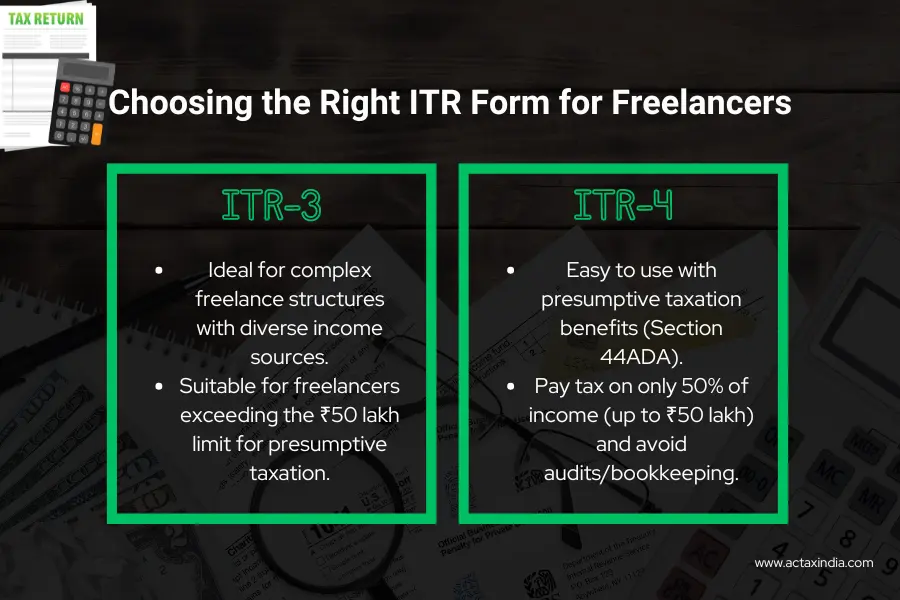
Opting for ITR-3 and ITR-4 forms is suggestible for all freelancers across India, as per the tax rules for freelancers in India. To be precise, the ITR-3 Form provides the option for business/profession, under which the Indian freelancers qualify (especially the ones having a complex freelancing service structure and bandwidth). On the other hand, the ITR-4 Form offers the presumptive taxation scheme (Section 44ADA), by which the freelancers can enjoy exemptions associated with auditing and bookkeeping. Moreover, as mentioned earlier, it allows freelancers to pay taxes for only half of their gross annual income if their total earnings remain below ₹50 lakhs. Refer to this blog 2024 ITR Filing Due Dates: A Complete Guide
Step-by-Step Guide to ITR Filing
As per the tax rules for freelancers in India, the ITR filing steps are as follows:
Step 1: Track income from freelancing for the financial year for which you’ll be submitting the ITR.
Step 2: Record all the eligible business expenses for ITR-related deductions.
Step 3: Select ITR-3 or ITR-4 based on your income and freelancing type.
Step 4: Access and fill the chosen form on the Income Tax e-Filing portal
Step 5: Enter accurate details about earnings, expenses, and deductions.
Step 6: Review and submit the completed form electronically.
Step 7: Maintain records like invoices, receipts, and bank statements (to submit when required).
Step 8: File your tax return by the designated deadline (July 31 for 2024).
Common Mistakes to Avoid During ITR Filing
Here’s a checklist of what you should avoid while filing your ITR online:
- Incorrect personal and business information.
- Selection of the wrong ITR Form.
- Not reporting all the incomes.
- Not filing the ITR within the designated time.
- Not verifying the details of the ITR form before submission.
- Not mentioning the exempted income.
- Not properly checking all bank statements.
- Typing inaccurate account numbers.
Conclusion: Redefined Tax Rules for Freelancers in India!
To sum up, this extensive guide has ensured that the subject of tax rules for freelancers in India has been explained in detail. By following the guidelines contained in this blog and keeping abreast of the legislative changes that may affect your operations, you will be better placed to be financially prudent and manage your independent professional career effectively. It is important to note that when you undertake your taxes, it is essential to be well-informed, this way you create the framework for your future business endeavors. So, even if you’re a freelancer, contact Actax India to have a smooth taxation journey. This will enable you to focus more on what you do best – freelancing!
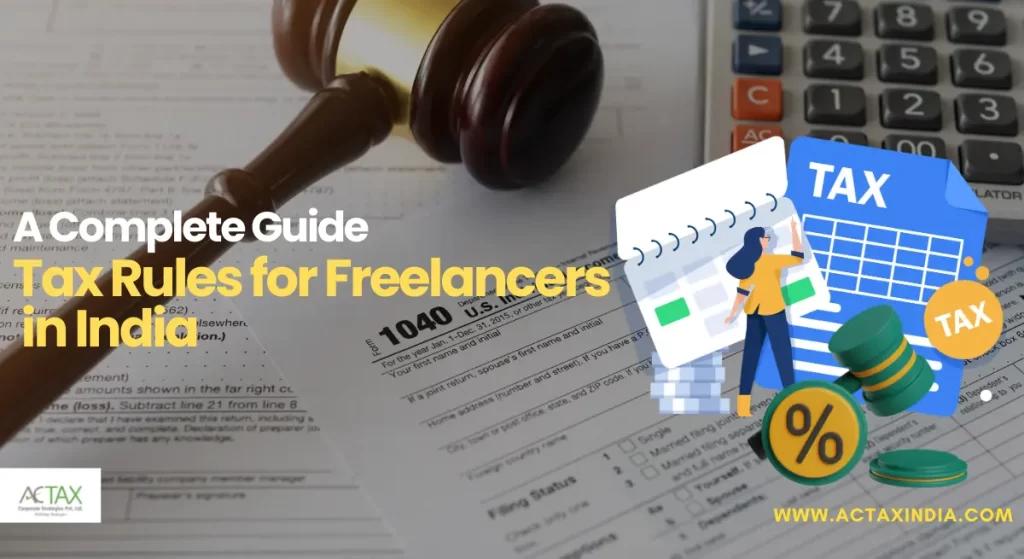
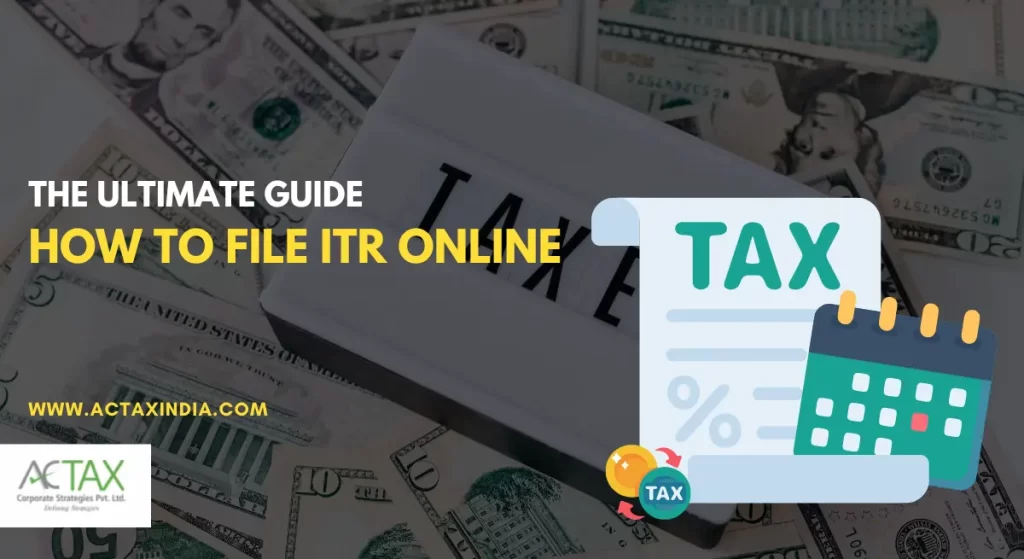
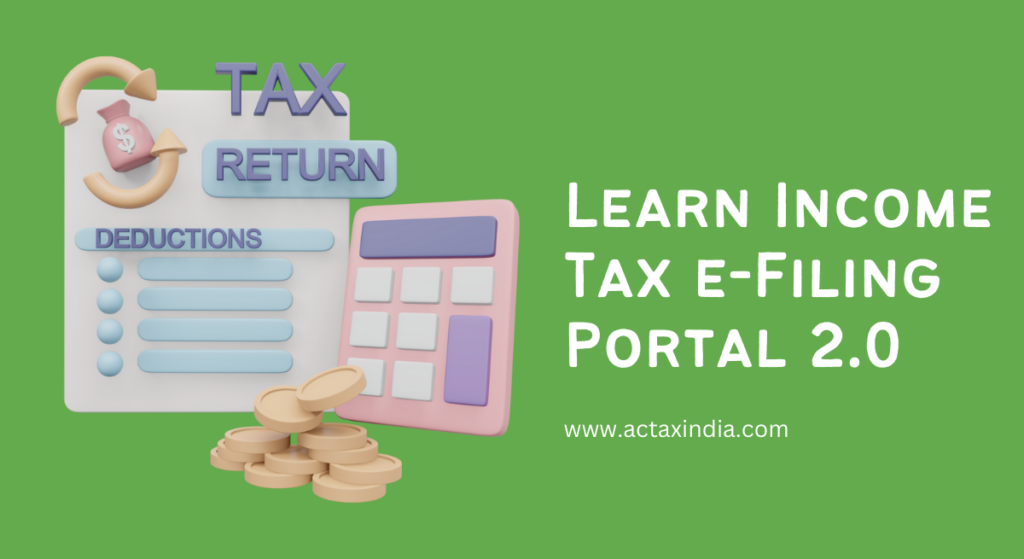
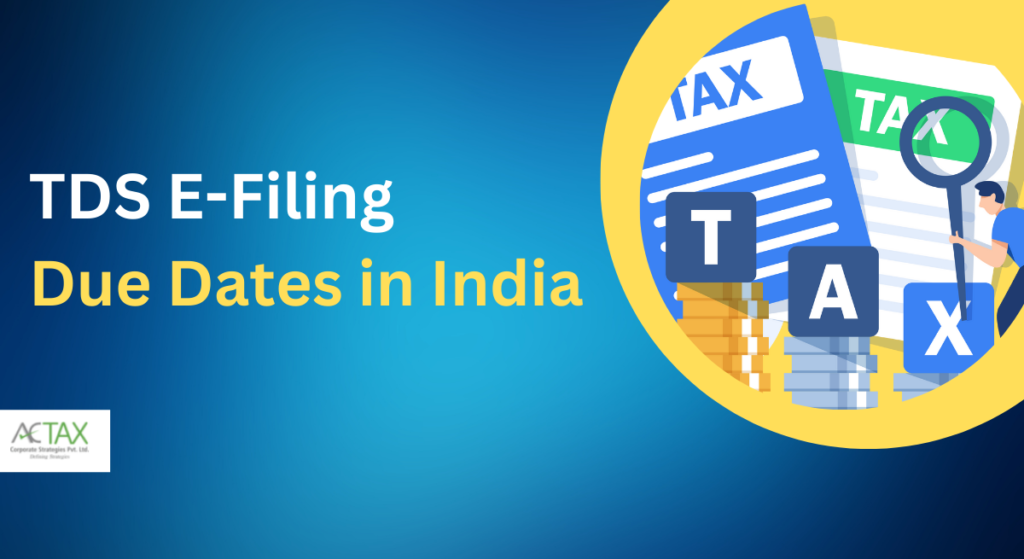



Pingback: Income Tax Slab Changes: Income Tax Slab for AY 2024-25 | Actax India
Some truly nice and utilitarian info on this website , also I believe the layout holds good features.
Thanks for sharing excellent informations. Your site is so cool. I’m impressed by the details that you¦ve on this blog. It reveals how nicely you perceive this subject. Bookmarked this web page, will come back for more articles. You, my friend, ROCK! I found just the info I already searched all over the place and simply couldn’t come across. What a perfect web-site.
Magnificent items from you, man. I’ve be aware your stuff prior to and you’re just extremely excellent. I actually like what you have obtained here, certainly like what you’re stating and the best way in which you are saying it. You are making it entertaining and you continue to care for to stay it wise. I can not wait to learn much more from you. That is actually a tremendous website.
I love your blog.. very nice colors & theme. Did you create this website yourself? Plz reply back as I’m looking to create my own blog and would like to know wheere u got this from. thanks
Hello. excellent job. I did not anticipate this. This is a excellent story. Thanks!
I have learn several just right stuff here. Definitely value bookmarking for revisiting. I wonder how much attempt you put to make one of these fantastic informative website.
I like what you guys are up also. Such intelligent work and reporting! Keep up the superb works guys I’ve incorporated you guys to my blogroll. I think it’ll improve the value of my website 🙂
hello there and thank you for your information – I have certainly picked up something new from right here. I did however expertise some technical points using this web site, since I experienced to reload the web site a lot of times previous to I could get it to load properly. I had been wondering if your web hosting is OK? Not that I’m complaining, but sluggish loading instances times will sometimes affect your placement in google and can damage your quality score if advertising and marketing with Adwords. Well I am adding this RSS to my e-mail and can look out for much more of your respective interesting content. Ensure that you update this again very soon..
Very interesting subject , thanks for putting up.
Wonderful goods from you, man. I have understand your stuff previous to and you are just too magnificent. I really like what you’ve acquired here, really like what you are stating and the way in which you say it. You make it entertaining and you still care for to keep it smart. I can not wait to read far more from you. This is actually a terrific site.
After study a few of the blog posts on your website now, and I truly like your way of blogging. I bookmarked it to my bookmark website list and will be checking back soon. Pls check out my web site as well and let me know what you think.
What i do not realize is actually how you’re not really much more well-liked than you might be right now. You’re so intelligent. You realize therefore significantly relating to this subject, made me personally consider it from so many varied angles. Its like women and men aren’t fascinated unless it’s one thing to do with Lady gaga! Your own stuffs excellent. Always maintain it up!
Excellent post. I was checking constantly this blog and I’m impressed! Very useful info specifically the last part 🙂 I care for such information a lot. I was looking for this particular info for a very long time. Thank you and best of luck.
Loving the information on this site, you have done great job on the articles.
I’ve been absent for some time, but now I remember why I used to love this blog. Thanks, I’ll try and check back more frequently. How frequently you update your site?
We’re a group of volunteers and starting a new scheme in our community. Your site offered us with valuable information to work on. You’ve done a formidable job and our whole community will be thankful to you.
I’ve recently started a website, the info you offer on this web site has helped me tremendously. Thanks for all of your time & work.
Thanks for sharing superb informations. Your website is very cool. I am impressed by the details that you¦ve on this web site. It reveals how nicely you understand this subject. Bookmarked this web page, will come back for extra articles. You, my pal, ROCK! I found just the info I already searched everywhere and just could not come across. What a perfect site.
After I originally commented I clicked the -Notify me when new comments are added- checkbox and now every time a remark is added I get 4 emails with the same comment. Is there any way you’ll be able to take away me from that service? Thanks!
Enjoyed reading through this, very good stuff, appreciate it.
An impressive share, I just given this onto a colleague who was doing a little analysis on this. And he in fact bought me breakfast because I found it for him.. smile. So let me reword that: Thnx for the treat! But yeah Thnkx for spending the time to discuss this, I feel strongly about it and love reading more on this topic. If possible, as you become expertise, would you mind updating your blog with more details? It is highly helpful for me. Big thumb up for this blog post!
Hello.This article was really remarkable, particularly because I was browsing for thoughts on this topic last Friday.
Some genuinely great content on this internet site, appreciate it for contribution.
Some truly nice and useful information on this site, also I believe the layout holds great features.
Hello There. I discovered your blog using msn. This is a really well written article. I’ll make sure to bookmark it and come back to learn extra of your useful information. Thanks for the post. I will definitely return.
I believe this is among the most significant info for me. And i am glad reading your article. But want to commentary on some normal issues, The web site style is wonderful, the articles is in point of fact great : D. Just right job, cheers
Howdy, i read your blog from time to time and i own a similar one and i was just curious if you get a lot of spam remarks? If so how do you prevent it, any plugin or anything you can advise? I get so much lately it’s driving me crazy so any help is very much appreciated.
Great ?V I should definitely pronounce, impressed with your site. I had no trouble navigating through all tabs as well as related info ended up being truly easy to do to access. I recently found what I hoped for before you know it in the least. Quite unusual. Is likely to appreciate it for those who add forums or something, website theme . a tones way for your client to communicate. Excellent task..
Great blog here! Also your site loads up very fast! What host are you using? Can I get your affiliate link to your host? I wish my website loaded up as quickly as yours lol
I have been reading out a few of your stories and it’s pretty nice stuff. I will make sure to bookmark your blog.
As a Newbie, I am continuously browsing online for articles that can benefit me. Thank you
???????
Appreciate you sharing, great article post.Much thanks again. Keep writing.
Major thanks for the blog article.Much thanks again. Fantastic.
Awesome insights! The advice on avoiding short-term loans is so important. I’ve been informing others about this, and it’s made a big difference. I also created a no-cost guide on options to payday loans, which your audience might find useful. Great job!
I read this post fully concerning the comparison of newest and previous technologies, it’s remarkable article.
Yes! Finally someone writes about ?? ??? ??.
Hi, i think that i saw you visited my website thus i came to “return the favor”.I’m attempting to find things to enhance my website!I suppose its ok to use some of your ideas!!
he blog was how do i say it… relevant, finally something that helped me. Thanks
I’d have to examine with you here. Which isn’t one thing I normally do! I enjoy studying a put up that can make people think. Also, thanks for allowing me to comment!
I think this is a real great post.Really looking forward to read more. Will read on…
As a Newbie, I am continuously browsing online for articles that can aid me. Thank you
Currently it looks like BlogEngine is the top blogging platform out there right now. (from what I’ve read) Is that what you are using on your blog?
I got what you mean , regards for posting.Woh I am glad to find this website through google.
Major thankies for the blog article.Really looking forward to read more.
Major thankies for the article.Thanks Again. Cool.
I really liked your article post. Much obliged.
I think this is a real great article post.Much thanks again. Great.